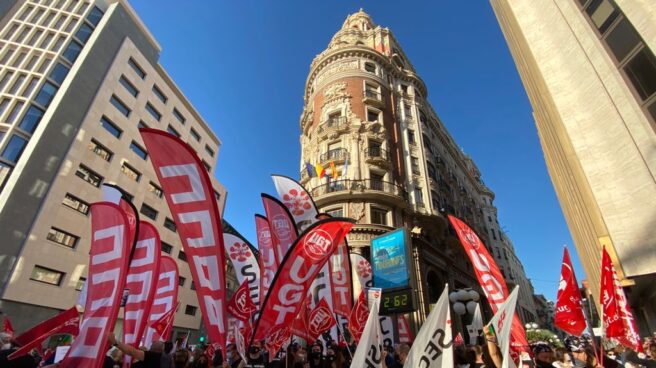

File image of protest against ERE CaixaBank
The workers of the old boxes have been demanding the opening of the negotiating table for eight months now. This Wednesday, the CECA (old savings bank association) called on the three majority unions (FINE, CCOO and UGT) to resume negotiations. Employees are asking for pay increases and improvements to their credit, among other demands. At the moment, major progress from this meeting is not expected, but they are encouraging.
Sources at Fine, the major union for the savings banks, say they will fight for “any upward change in remuneration is immediateto alleviate inflationary pressures on industry wages.”
At the same time, representatives of workers demand the opening of the Industry Observatory, that is, amendments to the employment contract, which will be valid until the end of 2023. In this agreement, fixed salary increment of 1% for the last yearbut the unions say it’s not enough, as inflation closed 2022 with a 5.7% rise.
Therefore, workers demand “real, renegotiable and consolidated wage increases (That is, even if the employment situation of a person changes, it remains the same). For this to be effective, FINE specifies that it must occur “inexcusably” through non-absorption, compensation, or gradual adaptation of the same.” But the unions are not limited to wage increases, as they demand a revision of allowances and mileage.
In recent months, workers’ representatives have asked CECA affiliates (CaixaBank, Unicaja Banco, Abanca, Ibercaja, and others) to start negotiations with unions on fixed-rate loans for the workforce. “The goal is to alleviate the severe pressure that interest rates are putting on our loans.”, specify from FINE. The situation condemned by the majority union, together with the extreme rise in the consumer price index, “creates an unsustainable situation for many.”
The unions are approaching this meeting with caution as they demand improvements from May 2022. The outcome of the meeting will depend, as the workers pointed out, on the position of the employer. and how far they are willing to go. However, they admit that this is the first negotiation meeting, so “you should test it first and see how it goes.”
In conclusion, the idea is to improve the wage conditions of the labor force to compensate for the loss in purchasing power caused by rising CPI and rising interest rates.
The unions hope to reach an agreement as soon as possible, as they have already done with the Spanish Banking Association (AEB). On November 29, AEB and KKOO and UGT (without approval from FINE) made changes to the labor agreement, which they signed before December 31 of this year. Thus, a 4.5% salary increase was agreed for 2023 compared to the 1.25% stipulated in the collective agreement.
“This measure is taken on the basis of a well-known CPI agreed in the Industry Observatory”, indicated the majority of unions. However, from FINE, another union with representation at the table, they explained that they did not sign because it only changes by 3.25% what has already been agreed and “this will not reach the majority of the workforce, given the absorbent nature of any supplement regulated in organizations”.
The meeting precedes the mobilization
FINE, CCOO and UGT have announced a mobilization, which is still ongoing, at the headquarters of CaixaBank, Unicaja, Ibercaja and Abanca, coinciding with the presentation of the results, for employers to convene a negotiating table as they indicated that CECA refused to reopen the convention table.
At the last meeting of the Industry Observatory on October 20, employers stated “does not agree with the analysis of industry reality” submitted by the unions and asked for time to clear up any ambiguities. The unions believe that after three months, the templates “need a forceful response.” In addition, they deplore this situation, given the “historic results that the companies are about to present, as well as a sharp increase in declared dividend payments.”
Source: El Independiente